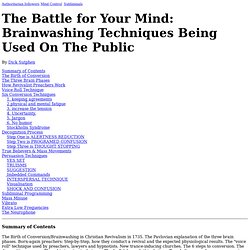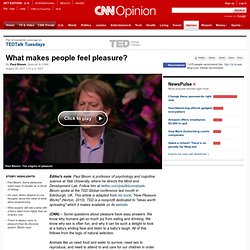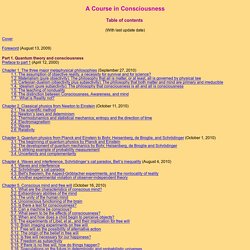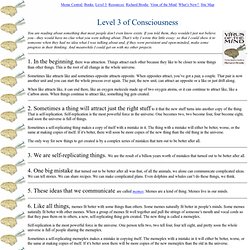

Rhetological Fallacies. Internet Encyclopedia of Philosophy. The Battle for Your Mind: Brainwashing Techniques Being Used On The Public By Dick Sutphen. Authoritarian followers Mind Control Subliminals By Dick Sutphen Summary of Contents The Birth of Conversion The Three Brain Phases How Revivalist Preachers Work Voice Roll Technique Six Conversion Techniques 1. keeping agreements 2.physical and mental fatigue 3. increase the tension 4.

Uncertainty. 5. Mind - New Research Focuses on the Power of Physical Contact. What makes people feel pleasure? Paul Bloom: The origins of pleasure Paul Bloom: Some pleasures seem easy to explain as a result of biologyHe says others depend on our thoughts about the value of what we're experiencingWine experts will rate a wine with a fancy label more highly than an ordinary oneThere is always more to pleasure than its physical aspect, Bloom says Editor's note: Paul Bloom is professor of psychology and cognitive science at Yale University, where he directs the Mind and Development Lab.

Follow him at twitter.com/paulbloomatyale. Bloom spoke at the TED Global conference last month in Edinburgh, UK. Hysteria, Demons, and More: Depression Throughout History - depression. Table of contents. (With last update date) Cover Foreword (August 13, 2009) Part 1.

Quantum theory and consciousness Preface to part 1 (April 12, 2000) LUCID DREAMING. Memetics. This article is related to the study of self-replicating units of culture, not to be confused with Mimesis.

Memetics is a theory of mental content based on an analogy with Darwinian evolution, originating from the popularization of Richard Dawkins' 1976 book The Selfish Gene.[1] Proponents describe memetics as an approach to evolutionary models of cultural information transfer. The meme, analogous to a gene, was conceived as a "unit of culture" (an idea, belief, pattern of behaviour, etc.) which is "hosted" in the minds of one or more individuals, and which can reproduce itself, thereby jumping from mind to mind. Thus what would otherwise be regarded as one individual influencing another to adopt a belief is seen as an idea-replicator reproducing itself in a new host. As with genetics, particularly under a Dawkinsian interpretation, a meme's success may be due to its contribution to the effectiveness of its host. History[edit] The modern memetics movement dates from the mid-1980s. Calendar of Courses and Events at Alderleaf.
2014 Calendar of Courses and Events To sign up for classes, visit our Course Registration Page.

Learn about course logistics by visiting the Frequently Asked Questions. Course Discounts - Receive 10% Off! We offer three ways to receive a 10% discount for our short courses (day-long, weekend, and week-long courses): 1. 2. 3. (Please note: To receive the the discount, you must register by phone or postal mail, as our online registration system is unable to calculate discounts) Free Online Course Materials. 50 Lessons Life Taught Me. To celebrate growing older, I once wrote the 45 lessons life taught me.

It is the most-requested column I’ve ever written. When my odometer rolled over to 50, I updated the list. Self-Directed Neuroplasticity: A 21st-Century View of Meditation. Ed.

Note: In the following dialogue, excerpted and edited from the Institute of Noetic Sciences’ teleseminar series “Exploring the Noetic Sciences.” IONS Director of Research Cassandra Vieten talks with neuropsychologist and meditation teacher Rick Hanson, author with neurologist Richard Mendius, MD, of Buddha’s Brain: The Practical Neuroscience of Happiness, Love, and Wisdom. Rick will be speaking at the upcoming IONS International Conference taking place this July in San Francisco. Vieten: What exactly is contemplative neuroscience?
Hanson: Broadly defined, it’s the study of what happens in the brain when people are doing contemplative practices, how the brain changes with such practices. Level 3 of Consciousness by Richard Brodie. Meme Central Books Level 3 Resources Richard Brodie Virus of the Mind What’s New?

Site Map Level 3 of Consciousness You are reading about something that most people don’t even know exists. Church of Virus. Journal of Memetics - Evolutionary Models of Information Transmission. How to Plant Ideas in Someones Mind - StumbleUpon. 13 Simple Steps To Get You Through A Rough Day. Why Ruminating is Unhealthy and How to Stop.
Ruminating is like a record that’s stuck and keeps repeating the same lyrics.

It’s replaying an argument with a friend in your mind. It’s retracing past mistakes. When people ruminate, they over-think or obsess about situations or life events, such as work or relationships. Research has shown that rumination is associated with a variety of negative consequences, including depression, anxiety, post-traumatic stress disorder, binge-drinking and binge-eating. Why does rumination lead to such harmful results? For some people, drinking or binge-eating becomes a way to cope with life and drown out their ruminations, according to Susan Nolen-Hoeksema, Ph.D, a psychologist and professor at Yale University. Not surprisingly, ruminating conjures up more negative thoughts.
Rumination also becomes the fast track to feeling helpless. It can even turn people away. 5 Logical Fallacies That Make You Wrong More Than You Think. #2.

We're Hard-Wired to Have a Double Standard Here's a good way to ruin your afternoon. Go on the Internet and find any discussion thread that brings up overweight people (like this or this one). Stand back and watch as a crowd absolutely rants about how incredibly easy it is to lose weight, and how incredibly lazy you have to be to get fat. The conclusion will be that being fat is literally a moral failing and the sign of a bad, disgusting human being. GettyIn at least four states, we can legally hunt this man.